外研版(2019)选择性必修二精品课件:Unit 3 Times change Developing ideas课件(24张ppt)
文档属性
| 名称 | 外研版(2019)选择性必修二精品课件:Unit 3 Times change Developing ideas课件(24张ppt) |  | |
| 格式 | ppt | ||
| 文件大小 | 32.6MB | ||
| 资源类型 | 教案 | ||
| 版本资源 | 外研版(2019) | ||
| 科目 | 英语 | ||
| 更新时间 | 2021-01-19 15:49:02 | ||
图片预览

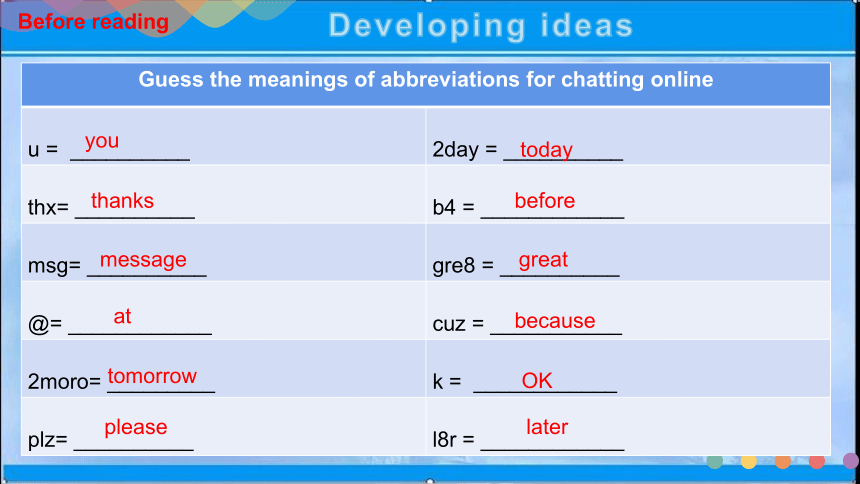
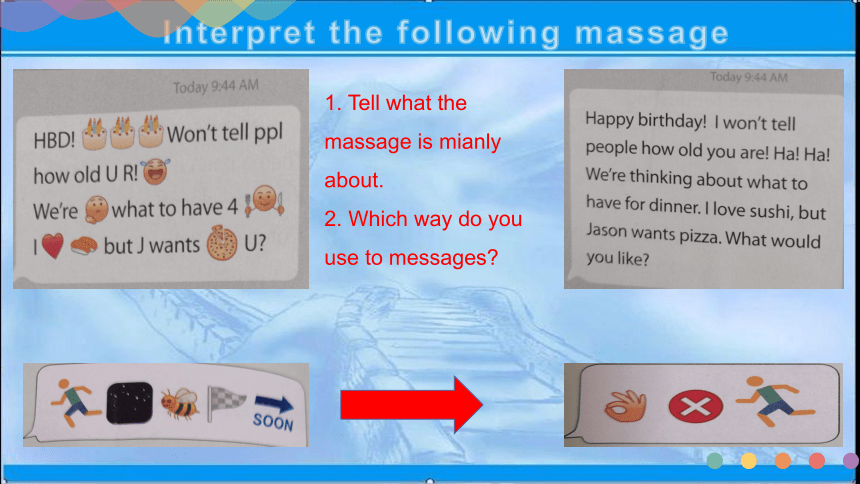
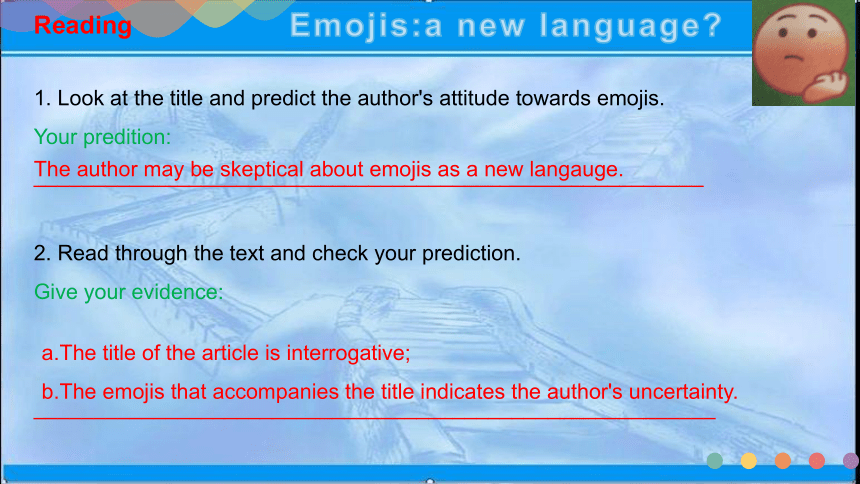
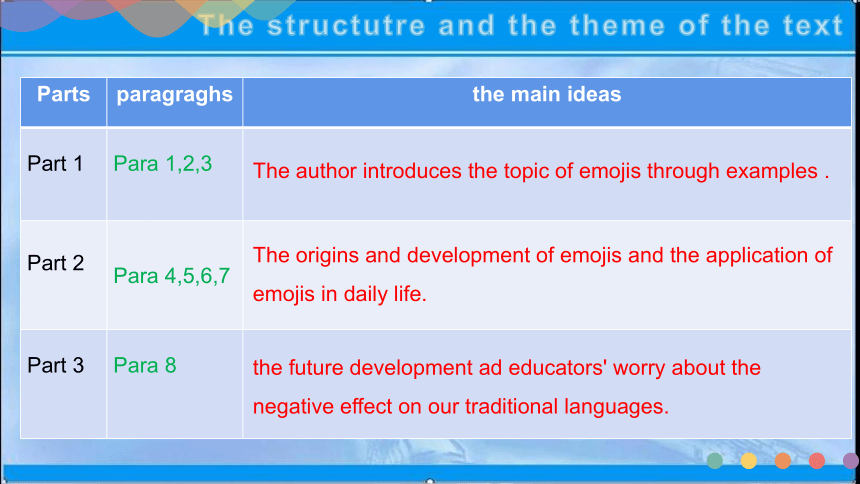
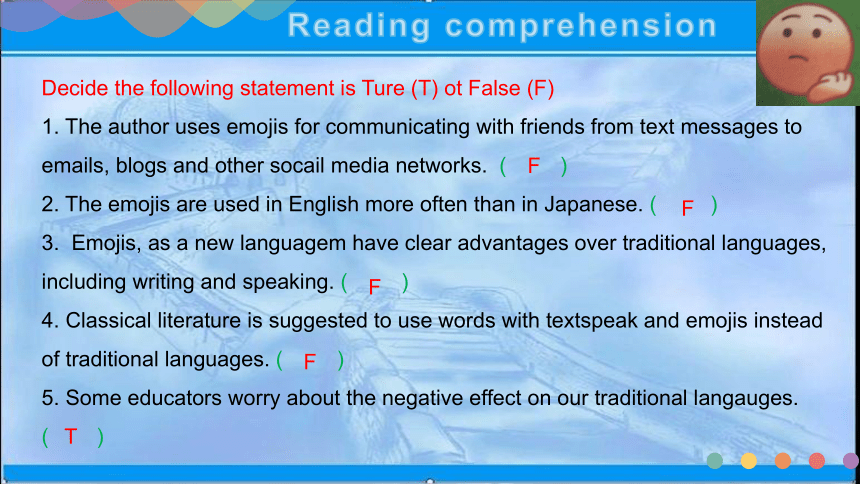
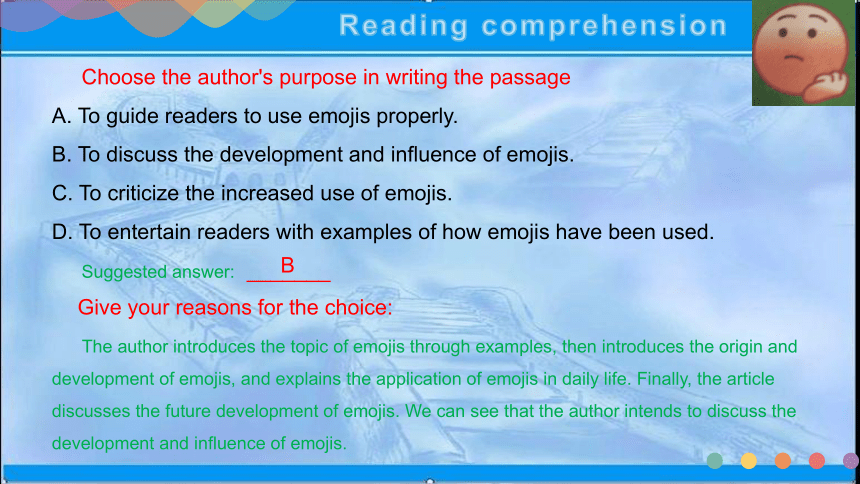
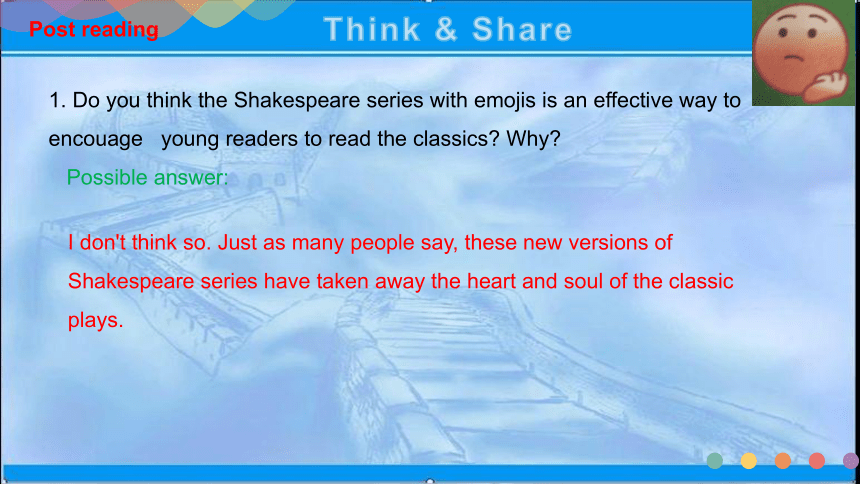
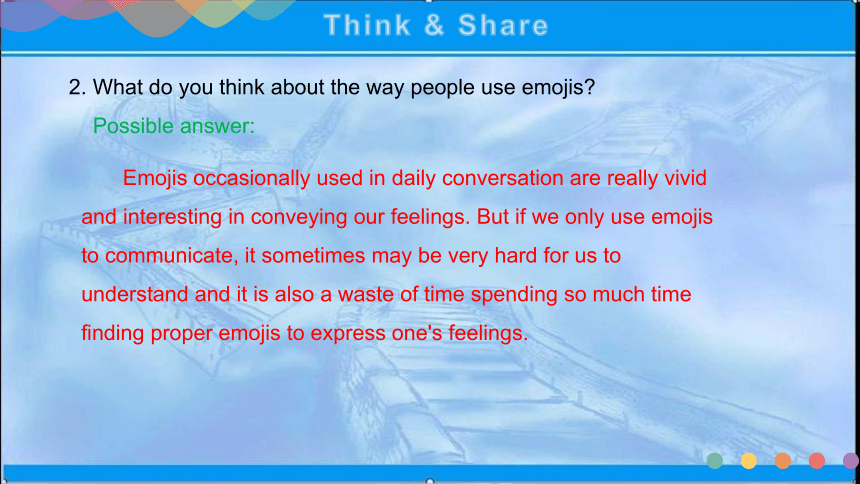
文档简介
外研版英语 选择性必须必修第二册
Unit 3 Times change
Period 3 Developing ideas &Presenting ideas
Before reading
Guess the meanings of abbreviations for chatting online
u = __________
2day = __________
thx= __________
b4 = ____________
msg= __________
gre8 = __________
@= ____________
cuz = ___________
2moro= _________
k = ____________
plz= __________
l8r = ____________
you
thanks
message
at
tomorrow
please
today
before
great
because
OK
later
1. Tell what the massage is mianly about.
2. Which way do you use to messages?
Reading
1. Look at the title and predict the author's attitude towards emojis.
Your predition:
________________________________________________________
2. Read through the text and check your prediction.
Give your evidence:
_________________________________________________________
The author may be skeptical about emojis as a new langauge.
a.The title of the article is interrogative;
b.The emojis that accompanies the title indicates the author's uncertainty.
Parts
paragraghs
the main ideas
Part 1
Para 1,2,3
Part 2
Para 4,5,6,7
Part 3
Para 8
The author introduces the topic of emojis through examples .
The origins and development of emojis and the application of emojis in daily life.
the future development ad educators' worry about the negative effect on our traditional languages.
Decide the following statement is Ture (T) ot False (F)
1. The author uses emojis for communicating with friends from text messages to emails, blogs and other socail media networks. ( )
2. The emojis are used in English more often than in Japanese. ( )
3. Emojis, as a new languagem have clear advantages over traditional languages, including writing and speaking. ( )
4. Classical literature is suggested to use words with textspeak and emojis instead of traditional languages. ( )
5. Some educators worry about the negative effect on our traditional langauges. ( )
F
F
F
F
T
Choose the author's purpose in writing the passage
A. To guide readers to use emojis properly.
B. To discuss the development and influence of emojis.
C. To criticize the increased use of emojis.
D. To entertain readers with examples of how emojis have been used.
Suggested answer: _______
B
Give your reasons for the choice:
The author introduces the topic of emojis through examples, then introduces the origin and development of emojis, and explains the application of emojis in daily life. Finally, the article discusses the future development of emojis. We can see that the author intends to discuss the development and influence of emojis.
Post reading
1. Do you think the Shakespeare series with emojis is an effective way to encouage young readers to read the classics? Why?
Possible answer:
I don't think so. Just as many people say, these new versions of Shakespeare series have taken away the heart and soul of the classic plays.
2. What do you think about the way people use emojis?
Possible answer:
Emojis occasionally used in daily conversation are really vivid and interesting in conveying our feelings. But if we only use emojis to communicate, it sometimes may be very hard for us to understand and it is also a waste of time spending so much time finding proper emojis to express one's feelings.
3. What lifestyle changes does each reading passage in this unit focus on? What is the common message conveyed in both passage?
Possible answer:
A. The first reading passage focuses on the changes in the way we read. The second reading passage focuses on the changes in the way we communicate.
B. The development of technology promotes the change of lifestyle.
Perhaps people will one day choose to communicate in pictures, and forget how to write properly.
Do you agree or disagree with it? (For example, I disagree with it )
Reasons
Evidence
1. It's unconvenient for us to use pictures, especially when people are not good at drawing.
2. Pictures can be confusing when using them.
3. It is extremely difficult to switch the classic works and documents into pictures.
Before writing
I was watching a superhero film the other day and a thought occurred to me: where does Superman get changed these days? In the comics and earlier films, Clark Kent would pop into a phone box to change into his Superman costume.
1. Why does the author start
the passage by writing about Superman?
Possible answer:
The author intends to introduce the topic -- the development of technology has brought about great changes in the way people communicate.
But these days, phone boxes are hard to find. The main reason for this is simply that we don't need them any more.
2. What will disappear in the future accoding to the passage?
What is the major reason for this phenomunon?
3. What supporting arguments does the author give to make the ponit convincing?
A. Almost everyone these days carries a mobile phone with them. It is certainly more convenient to take a mobile phone and make a call at the touch of the button than to press a series of long numbers on a telephone.
B. Even if we could remember a number and needed to call it urgently, it would still be more convenient to borrow a mobile phone from someone else than walk around looking for a phone box.
Something: The TV
Reasons:
We have laptops, computers and smart phones, with enable us to go online and search for anything we are interested in, from TV series, news to entertainment programs. What's more, they are all portable. People can take them anywhere they like.
Supporting arguments:
TVs take up too much room while laptops, computers and smartphones can help save much space.
changes
The traditional way of teaching
The way of learning is more vivid now
Learning activites
Changes
homework
exam
classroom
teacher
Students no lomger write on the notebooks.
No paper tests.
Students no longer attend lectures in the classroom.
The teacher's role may be smaller.
1. What is your understanding of the driving force behind the changes to out lifestyle?
____________________________________
The need for social interaction.
2. What text types have you learnt about? What are their features?
___________________________________________________________________
They're descriptive texts. They start with examples and then summarize the main idea.
3. What words, expressions and structures have you learnt?
_____________________________________.
The past continuous passive voice.
4. What improvement have you made in understanding defferent culture?
_____________________________________________________________________
I am more aware of the technological developments in recent years.
5. What improvement have you made in using learning strategies and exploring effective ways of learning?
ask teachers for help when meeting qusetions; besies, consciously and activites acquiring knowledge.
6. What improvement have you made in analyzing and solving problems?
Learning to grasp the key of prblems; actively participating in the class-discussions; tell others honestly what difficulty you have had.
1. When first introduced in Japan in 1999, emojis were limited to 176 simple designs.
?[句式分析] “When first introduced in Japan in 1999 ”为过去分词短语作时间状语, 动词introduce与其逻辑主语 emojis构成被动语态的关系。该结构相当于状语从句When emojis were first introduced in Japan in 1999.
?[尝试翻译] 表情符号与1999年首次在日本推出时, 仅有176 种简单的设计。
2. But this makes others, especially educators, worry that we are losing the ability to communicate properly using the written word, or even the spoken word.
?[句式分析] “that we are losing the ability to communicate properly using the written word, or even the spoken word. ” that 引导的从句作worry的宾语, 其中 不定式
“to communicate ”作名词ability的后置定语; “properly using the written word, or even the spoken word”.为现在分词短语作方式状语。
?[尝试翻译] 但这让其他人,尤其是教育工作者担心,我们正在失去正确使用书面语言,甚至口头语言进行交流的能力。
3. And even if we could remember a number and needed to call it urgently, it would still be more convenient to borrow a mobile phone from someone else than walk around looking for a phone box.
?[句式分析] “even if” 意为“即使”,引导让步状语从句;“to borrow a mobile phone from someone else than walk around looking for a phone box” 为不定式短语作主语而且后置;“looking for a phone box”现在分词短语作伴随状语。
?[尝试翻译] 即使我们记得一个电话号码,需要紧急拨打,从别人那里借一部手机仍然比四处找电话亭更方便。
1. expand upon
8. would rather do ...than do...
2. due to
9. have a tendency to do sth
3. be accessible to
10. as we can see, ...
4. run late
11. search for
5. hear and soul
12. be similar to...
6. focus on
13. have an advantage over...
7. in any way
14. It's best that--clause
1. Review the vocabulary and the language ponits of the text.
2. Master how to give your arguments and offer evidence in support of your arguments
3. Write a talk about how learning will change in the future.
Unit 3 Times change
Period 3 Developing ideas &Presenting ideas
Before reading
Guess the meanings of abbreviations for chatting online
u = __________
2day = __________
thx= __________
b4 = ____________
msg= __________
gre8 = __________
@= ____________
cuz = ___________
2moro= _________
k = ____________
plz= __________
l8r = ____________
you
thanks
message
at
tomorrow
please
today
before
great
because
OK
later
1. Tell what the massage is mianly about.
2. Which way do you use to messages?
Reading
1. Look at the title and predict the author's attitude towards emojis.
Your predition:
________________________________________________________
2. Read through the text and check your prediction.
Give your evidence:
_________________________________________________________
The author may be skeptical about emojis as a new langauge.
a.The title of the article is interrogative;
b.The emojis that accompanies the title indicates the author's uncertainty.
Parts
paragraghs
the main ideas
Part 1
Para 1,2,3
Part 2
Para 4,5,6,7
Part 3
Para 8
The author introduces the topic of emojis through examples .
The origins and development of emojis and the application of emojis in daily life.
the future development ad educators' worry about the negative effect on our traditional languages.
Decide the following statement is Ture (T) ot False (F)
1. The author uses emojis for communicating with friends from text messages to emails, blogs and other socail media networks. ( )
2. The emojis are used in English more often than in Japanese. ( )
3. Emojis, as a new languagem have clear advantages over traditional languages, including writing and speaking. ( )
4. Classical literature is suggested to use words with textspeak and emojis instead of traditional languages. ( )
5. Some educators worry about the negative effect on our traditional langauges. ( )
F
F
F
F
T
Choose the author's purpose in writing the passage
A. To guide readers to use emojis properly.
B. To discuss the development and influence of emojis.
C. To criticize the increased use of emojis.
D. To entertain readers with examples of how emojis have been used.
Suggested answer: _______
B
Give your reasons for the choice:
The author introduces the topic of emojis through examples, then introduces the origin and development of emojis, and explains the application of emojis in daily life. Finally, the article discusses the future development of emojis. We can see that the author intends to discuss the development and influence of emojis.
Post reading
1. Do you think the Shakespeare series with emojis is an effective way to encouage young readers to read the classics? Why?
Possible answer:
I don't think so. Just as many people say, these new versions of Shakespeare series have taken away the heart and soul of the classic plays.
2. What do you think about the way people use emojis?
Possible answer:
Emojis occasionally used in daily conversation are really vivid and interesting in conveying our feelings. But if we only use emojis to communicate, it sometimes may be very hard for us to understand and it is also a waste of time spending so much time finding proper emojis to express one's feelings.
3. What lifestyle changes does each reading passage in this unit focus on? What is the common message conveyed in both passage?
Possible answer:
A. The first reading passage focuses on the changes in the way we read. The second reading passage focuses on the changes in the way we communicate.
B. The development of technology promotes the change of lifestyle.
Perhaps people will one day choose to communicate in pictures, and forget how to write properly.
Do you agree or disagree with it? (For example, I disagree with it )
Reasons
Evidence
1. It's unconvenient for us to use pictures, especially when people are not good at drawing.
2. Pictures can be confusing when using them.
3. It is extremely difficult to switch the classic works and documents into pictures.
Before writing
I was watching a superhero film the other day and a thought occurred to me: where does Superman get changed these days? In the comics and earlier films, Clark Kent would pop into a phone box to change into his Superman costume.
1. Why does the author start
the passage by writing about Superman?
Possible answer:
The author intends to introduce the topic -- the development of technology has brought about great changes in the way people communicate.
But these days, phone boxes are hard to find. The main reason for this is simply that we don't need them any more.
2. What will disappear in the future accoding to the passage?
What is the major reason for this phenomunon?
3. What supporting arguments does the author give to make the ponit convincing?
A. Almost everyone these days carries a mobile phone with them. It is certainly more convenient to take a mobile phone and make a call at the touch of the button than to press a series of long numbers on a telephone.
B. Even if we could remember a number and needed to call it urgently, it would still be more convenient to borrow a mobile phone from someone else than walk around looking for a phone box.
Something: The TV
Reasons:
We have laptops, computers and smart phones, with enable us to go online and search for anything we are interested in, from TV series, news to entertainment programs. What's more, they are all portable. People can take them anywhere they like.
Supporting arguments:
TVs take up too much room while laptops, computers and smartphones can help save much space.
changes
The traditional way of teaching
The way of learning is more vivid now
Learning activites
Changes
homework
exam
classroom
teacher
Students no lomger write on the notebooks.
No paper tests.
Students no longer attend lectures in the classroom.
The teacher's role may be smaller.
1. What is your understanding of the driving force behind the changes to out lifestyle?
____________________________________
The need for social interaction.
2. What text types have you learnt about? What are their features?
___________________________________________________________________
They're descriptive texts. They start with examples and then summarize the main idea.
3. What words, expressions and structures have you learnt?
_____________________________________.
The past continuous passive voice.
4. What improvement have you made in understanding defferent culture?
_____________________________________________________________________
I am more aware of the technological developments in recent years.
5. What improvement have you made in using learning strategies and exploring effective ways of learning?
ask teachers for help when meeting qusetions; besies, consciously and activites acquiring knowledge.
6. What improvement have you made in analyzing and solving problems?
Learning to grasp the key of prblems; actively participating in the class-discussions; tell others honestly what difficulty you have had.
1. When first introduced in Japan in 1999, emojis were limited to 176 simple designs.
?[句式分析] “When first introduced in Japan in 1999 ”为过去分词短语作时间状语, 动词introduce与其逻辑主语 emojis构成被动语态的关系。该结构相当于状语从句When emojis were first introduced in Japan in 1999.
?[尝试翻译] 表情符号与1999年首次在日本推出时, 仅有176 种简单的设计。
2. But this makes others, especially educators, worry that we are losing the ability to communicate properly using the written word, or even the spoken word.
?[句式分析] “that we are losing the ability to communicate properly using the written word, or even the spoken word. ” that 引导的从句作worry的宾语, 其中 不定式
“to communicate ”作名词ability的后置定语; “properly using the written word, or even the spoken word”.为现在分词短语作方式状语。
?[尝试翻译] 但这让其他人,尤其是教育工作者担心,我们正在失去正确使用书面语言,甚至口头语言进行交流的能力。
3. And even if we could remember a number and needed to call it urgently, it would still be more convenient to borrow a mobile phone from someone else than walk around looking for a phone box.
?[句式分析] “even if” 意为“即使”,引导让步状语从句;“to borrow a mobile phone from someone else than walk around looking for a phone box” 为不定式短语作主语而且后置;“looking for a phone box”现在分词短语作伴随状语。
?[尝试翻译] 即使我们记得一个电话号码,需要紧急拨打,从别人那里借一部手机仍然比四处找电话亭更方便。
1. expand upon
8. would rather do ...than do...
2. due to
9. have a tendency to do sth
3. be accessible to
10. as we can see, ...
4. run late
11. search for
5. hear and soul
12. be similar to...
6. focus on
13. have an advantage over...
7. in any way
14. It's best that--clause
1. Review the vocabulary and the language ponits of the text.
2. Master how to give your arguments and offer evidence in support of your arguments
3. Write a talk about how learning will change in the future.
